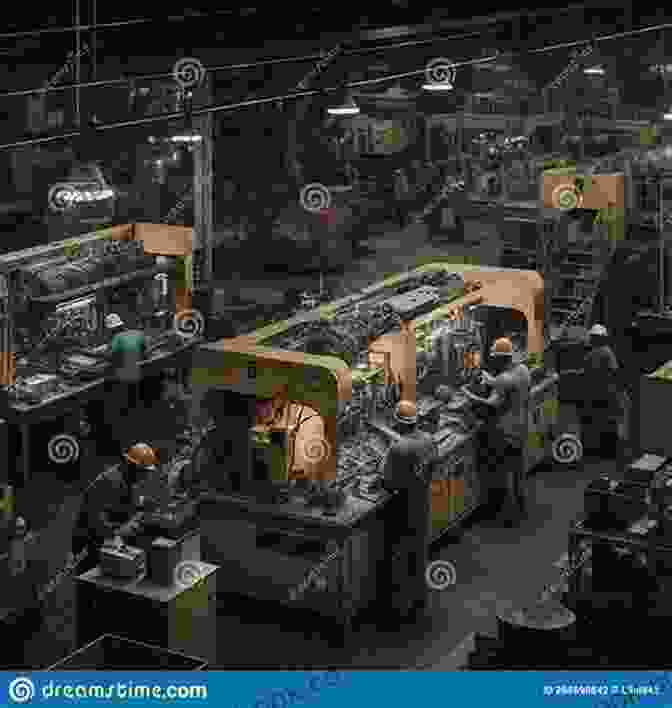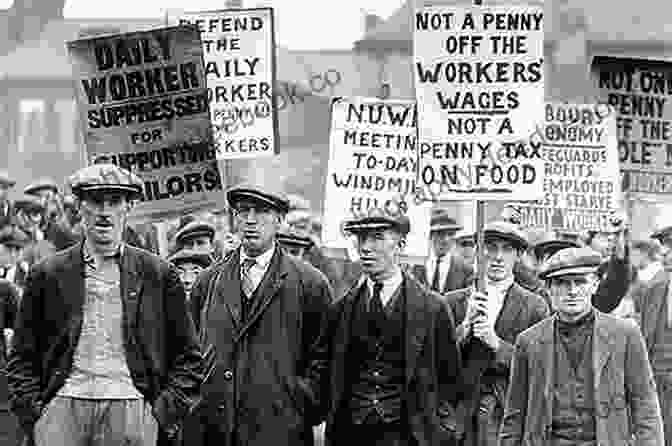The Rise and Fall of Victorian Enterprise: A Historical Examination

The Victorian era witnessed an extraordinary surge in enterprise and economic growth, transforming Britain into a global industrial powerhouse. However, the once-thriving Victorian enterprise eventually declined, its empire crumbling under the weight of economic, technological, and societal forces. This article examines the rise and fall of Victorian enterprise, analyzing the factors that contributed to its ascent and the reasons that led to its ultimate collapse.
4.7 out of 5
| Language | : | English |
| File size | : | 921 KB |
| Text-to-Speech | : | Enabled |
| Screen Reader | : | Supported |
| Enhanced typesetting | : | Enabled |
| Word Wise | : | Enabled |
| Print length | : | 169 pages |
| Lending | : | Enabled |
The Rise of Victorian Enterprise
Industrial Revolution and Technological Advancements
The Victorian era coincided with the advent of the Industrial Revolution, which brought about unprecedented technological advancements that fueled economic growth. The steam engine, invented by James Watt, revolutionized manufacturing, allowing for the mass production of goods. The development of railways and steamships facilitated the transportation of raw materials, manufactured products, and labor throughout the British Empire and beyond.
Free Trade and Empire Building
The Victorian era was characterized by a strong belief in free trade, a policy that allowed for the unrestricted import and export of goods. This led to increased trade with other countries, expanding British markets and providing access to raw materials essential for Victorian industries. Furthermore, Britain's imperial expansion during this period provided access to vast colonies that became sources of both raw materials and new markets for British goods.

The Zenith of Victorian Enterprise
International Expansion and Industrial Dominance
By the mid-19th century, Victorian enterprise had reached its zenith. Britain had become the world's leading industrial power, dominating global trade and manufacturing. British goods, from textiles to machinery, were exported to every corner of the globe. The British Empire provided a vast network of markets and resources for Victorian industries, ensuring a steady supply of raw materials and a growing demand for finished products.
Economic and Social Prosperity
The economic growth fueled by Victorian enterprise led to a period of unprecedented prosperity for Britain. The middle class expanded significantly, and living standards improved for many. The Victorian era saw the rise of new industries, including shipbuilding, engineering, and textiles. These industries provided employment opportunities and economic security for countless Britons.
The Decline of Victorian Enterprise
Economic Crises and Global Competition
The late Victorian era saw a series of economic crises, including the Long Depression of the 1870s and the Great Depression of the 1890s. These economic downturns led to a decline in demand for British goods and a loss of competitive advantage. Moreover, the rise of new industrial powers, particularly Germany and the United States, eroded Britain's global dominance in manufacturing.
Technological Stagnation and Labor Unrest
The Victorian era was also a period of technological stagnation. While other countries embraced new technologies and innovations, such as electricity and the internal combustion engine, Britain remained largely reliant on older technologies. This failure to keep up with technological advancements hindered industrial productivity and made Victorian enterprises less competitive. Additionally, labor unrest, including strikes and unionization, further undermined the stability of Victorian industries.

Societal Changes and Welfare Reforms
The late Victorian era also witnessed significant societal changes and the rise of social welfare reforms. The Factory Acts of the 1830s and 1840s, aimed at improving working conditions, resulted in increased labor costs and reduced profits for Victorian enterprises. Furthermore, the rise of social welfare programs, such as old age pensions and unemployment insurance, shifted the burden of social care from employers to the state.
Legacy and Impact
Industrial Decline and Deindustrialization
The decline of Victorian enterprise had a profound impact on Britain's economy and society. Deindustrialization led to the closure of factories, job losses, and a decline in economic growth. The once-thriving industrial centers of northern England and Scotland suffered from high unemployment and urban blight. Britain's relative economic decline compared to other industrial powers continued into the 20th century.
Transition to Service Economy and Globalization
The decline of Victorian enterprise also forced Britain to adapt to a new economic reality. The country gradually shifted towards a service-based economy, focusing on industries such as finance, insurance, and tourism. The British Empire remained a significant source of revenue, but the focus shifted from industrial exports to financial services and investments. Globalization and the rise of international trade and investment further shaped Britain's post-industrial economy.
The rise and fall of Victorian enterprise is a complex and multifaceted story. The Industrial Revolution, technological advancements, free trade, and imperial expansion all contributed to the remarkable growth of British industries during the Victorian era. However, economic crises, global competition, technological stagnation, labor unrest, and societal changes ultimately led to the decline of Victorian enterprise. The legacy of Victorian enterprise is evident in the industrial heritage of northern England and Scotland, the transition to a service economy, and Britain's ongoing role in global trade and investment. Understanding the factors that shaped the rise and fall of Victorian enterprise provides valuable insights into the dynamics of industrial development and economic change.
4.7 out of 5
| Language | : | English |
| File size | : | 921 KB |
| Text-to-Speech | : | Enabled |
| Screen Reader | : | Supported |
| Enhanced typesetting | : | Enabled |
| Word Wise | : | Enabled |
| Print length | : | 169 pages |
| Lending | : | Enabled |
Do you want to contribute by writing guest posts on this blog?
Please contact us and send us a resume of previous articles that you have written.
 Chapter
Chapter Text
Text Story
Story Genre
Genre Magazine
Magazine Paragraph
Paragraph Sentence
Sentence Shelf
Shelf Glossary
Glossary Bibliography
Bibliography Synopsis
Synopsis Annotation
Annotation Manuscript
Manuscript Codex
Codex Bestseller
Bestseller Library card
Library card Biography
Biography Autobiography
Autobiography Memoir
Memoir Encyclopedia
Encyclopedia Dictionary
Dictionary Thesaurus
Thesaurus Narrator
Narrator Character
Character Catalog
Catalog Card Catalog
Card Catalog Borrowing
Borrowing Periodicals
Periodicals Research
Research Academic
Academic Journals
Journals Rare Books
Rare Books Literacy
Literacy Study Group
Study Group Thesis
Thesis Storytelling
Storytelling Awards
Awards Book Club
Book Club Theory
Theory Textbooks
Textbooks Kirby Tribe
Kirby Tribe Gary Northfield
Gary Northfield Myron Golden
Myron Golden Ocean Vuong
Ocean Vuong Karen Russell
Karen Russell J D Harelik
J D Harelik Lilian Jackson Braun
Lilian Jackson Braun Daniel Hardie
Daniel Hardie Ralf Rothmann
Ralf Rothmann Rebecca Sillence
Rebecca Sillence Scott Jasper
Scott Jasper David J Connor
David J Connor Nathan George
Nathan George Anita Brookner
Anita Brookner Diego Eis
Diego Eis Clare Hibbert
Clare Hibbert Michael Kolberg
Michael Kolberg Veronique Ang
Veronique Ang K I Peeler
K I Peeler Heather Wightman
Heather Wightman
Light bulbAdvertise smarter! Our strategic ad space ensures maximum exposure. Reserve your spot today!

 Yukio MishimaConnecting Sophisticated Capital with Talented Small Businesses: A Catalyst...
Yukio MishimaConnecting Sophisticated Capital with Talented Small Businesses: A Catalyst... Alfred RossFollow ·17.3k
Alfred RossFollow ·17.3k Art MitchellFollow ·13.2k
Art MitchellFollow ·13.2k Xavier BellFollow ·6.9k
Xavier BellFollow ·6.9k Andy HayesFollow ·3.7k
Andy HayesFollow ·3.7k Banana YoshimotoFollow ·16.5k
Banana YoshimotoFollow ·16.5k Ryūnosuke AkutagawaFollow ·12.4k
Ryūnosuke AkutagawaFollow ·12.4k Ivan CoxFollow ·4.9k
Ivan CoxFollow ·4.9k Simon MitchellFollow ·11.9k
Simon MitchellFollow ·11.9k

 Braden Ward
Braden WardFeminism's Forgotten Fight: The Ongoing Battle for...
The feminist movement has historically...

 Julio Cortázar
Julio CortázarBlue Heaven Black Night: A Literary Journey Through Love,...
In the realm of...

 Eddie Bell
Eddie BellA Journey Through Time: Exploring the Enchanting World of...
The vibrant tapestry of New...

 Lawrence Bell
Lawrence BellValiance Dragon Soul Press Anthology: A Literary Odyssey...
Step into a realm where...

 Aron Cox
Aron CoxEmbark on a Creative Odyssey with Jean Leinhauser's "101...
Unveil a Kaleidoscope of...
4.7 out of 5
| Language | : | English |
| File size | : | 921 KB |
| Text-to-Speech | : | Enabled |
| Screen Reader | : | Supported |
| Enhanced typesetting | : | Enabled |
| Word Wise | : | Enabled |
| Print length | : | 169 pages |
| Lending | : | Enabled |











